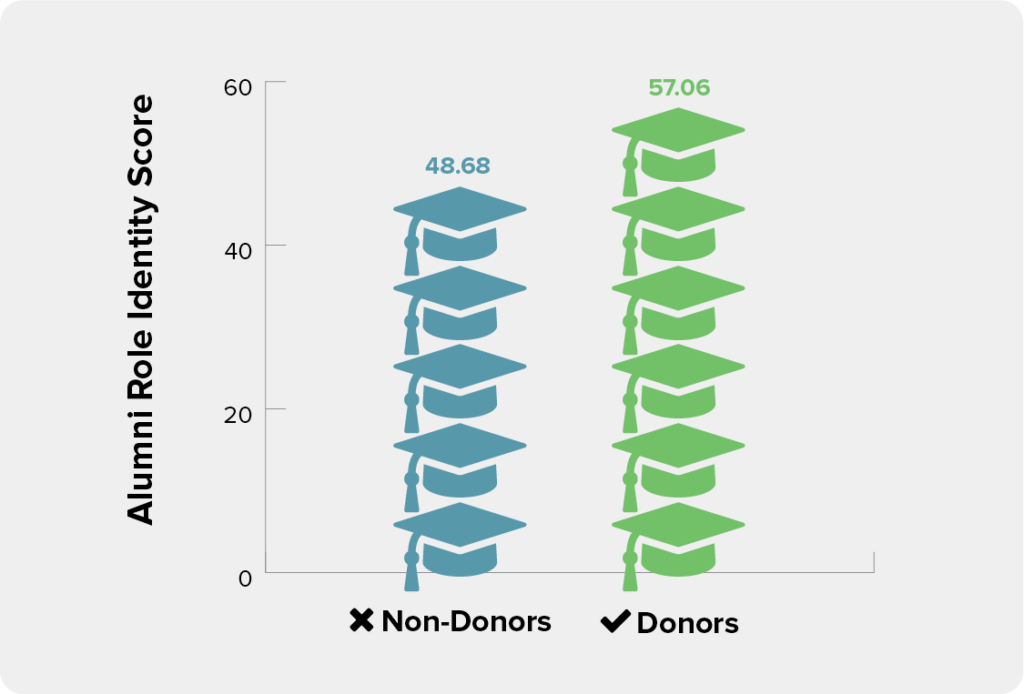Some say that predicting donor likelihood is the most important application of data science in higher education advancement.
I think it’s only the beginning.
In the first article of this series on Alumni Identity, we explored the ways in which counting alumni demographics or behaviors falls short of revealing how connected graduates feel to their alma mater.
Counting and storing alumni information (like age, class year, event attendance, volunteering, etc.) in a university database is well and good, but making advancement decisions based exclusively on this information creates a false sense of understanding of the factors and characteristics that truly influence alumni engagement and giving.
Predictive models may paint graduates in similar portraits, but these 1s and 0s do little to reveal the role the institution plays in the everyday lives of alumni.
In their seminal study on the topic, social scientists Weerts and Ronca (2007) used advanced statistics to compare alumni survey responses with alumni giving at a major, Midwestern public university. The researchers sought to answer the question: What alumni attribute best predicts giving?
What they found was surprising.
Alumni perceptions of their alma mater was a primary predictor of whether or not they gave back — more than any demographic or behavioral variable.
We now have a way to accurately measure those all-important alumni perceptions: Alumni Role Identity (“alumni identity”).
Not to be confused with affinity or feelings of pride/nostalgia, alumni identity is about who alumni are; it’s a psychometric measure of how graduates perceive their self-identity in relation to where they attended college. More than that, alumni identity is a proven way to measure the perceptions that Weerts and Ronca (2007) found to be a chief predictor of alumni giving.
In a study of 4,094 undergraduate alumni of a midsize, West coast Jesuit University, participants who were also donors reported much higher levels of alumni identity than their non-donor peers (Dillon, 2017).
Independent testing of these two groups revealed something else as well. It turns out that demographics like age, class year, and distance from campus had no bearing on a graduate’s degree of alumni identity.
The implication is clear. It’s time to stop trying to get graduates to do only institutional things (like come to events, volunteer, or become a mentor) and to start trying to find things institutions can do to influence the alumni identity of graduates.

When calculated as a score (see figure), alumni identity is a tremendously efficient predictor of alumni giving, and one that is independent of the standard demographics employed by advancement to drive fundraising strategy (think class year or student activities).
Well, if alumni identity is good indicator of inclination to give but is not influenced by alumni demographics, what exactly makes up the profile of graduates with low, moderate, or high alumni identity?
Here’s a sneak peak into the next article in this series: three of the five factors that influence alumni identity most are digital engagements.
That’s good news for colleges and universities, especially in this era of increased fundraising expectations and limited resources.
So what are these five factors? Which influence alumni identity with the highest ROI? What are some practical examples?
Join me as we explore these and other questions. Subscribe to the EverTrue blog and we’ll continue to post updates on this series.
Click here to go to part 3 of our alumni identity series.
Looking to identify social interactions, enhance engagement scores, or quantify alumni identity? We can help with that.
Read Dr. Jay Le Roux Dillon’s entire series on alumni identity.
Part 1: Are You Missing Advancement’s Most Important Metric?
Part 2: The Story Behind Giving Has Little to Do With 1s and 0s
Part 3: Digital Engagement ≥ Event Engagement? Yes.
Part 4: Meaningful Volunteer Experiences Are Best, But Far Too Few
Part 5: Data-driven Prospect Discovery Needs to Include Graduate Feelings of Connection
Part 6: Raising Alumni Identity Raises Dollars
Need more? Connect with the author…
LinkedIn
@jayldillon on Twitter
alumniidentity.com
Dr. Jay Le Roux Dillon is a social scientist and higher education advancement executive whose research focuses on broadening and measuring institutional value and impact among college and university alumni. He has served as Director of Alumni Engagement at the University of San Francisco and as Executive Director of Alumni Strategic Initiatives at UCLA. Jay is dedicated to improving philanthropy through data science in order to bring social justice and equity to education. He holds a doctorate in organization and leadership from USF and a master’s and bachelor’s degree in music from UCLA. Jay is a native of Riverside, California.